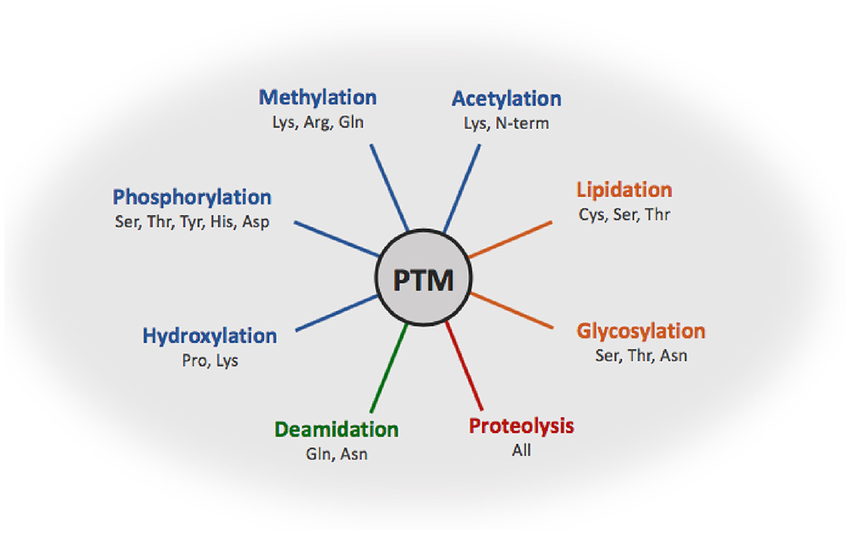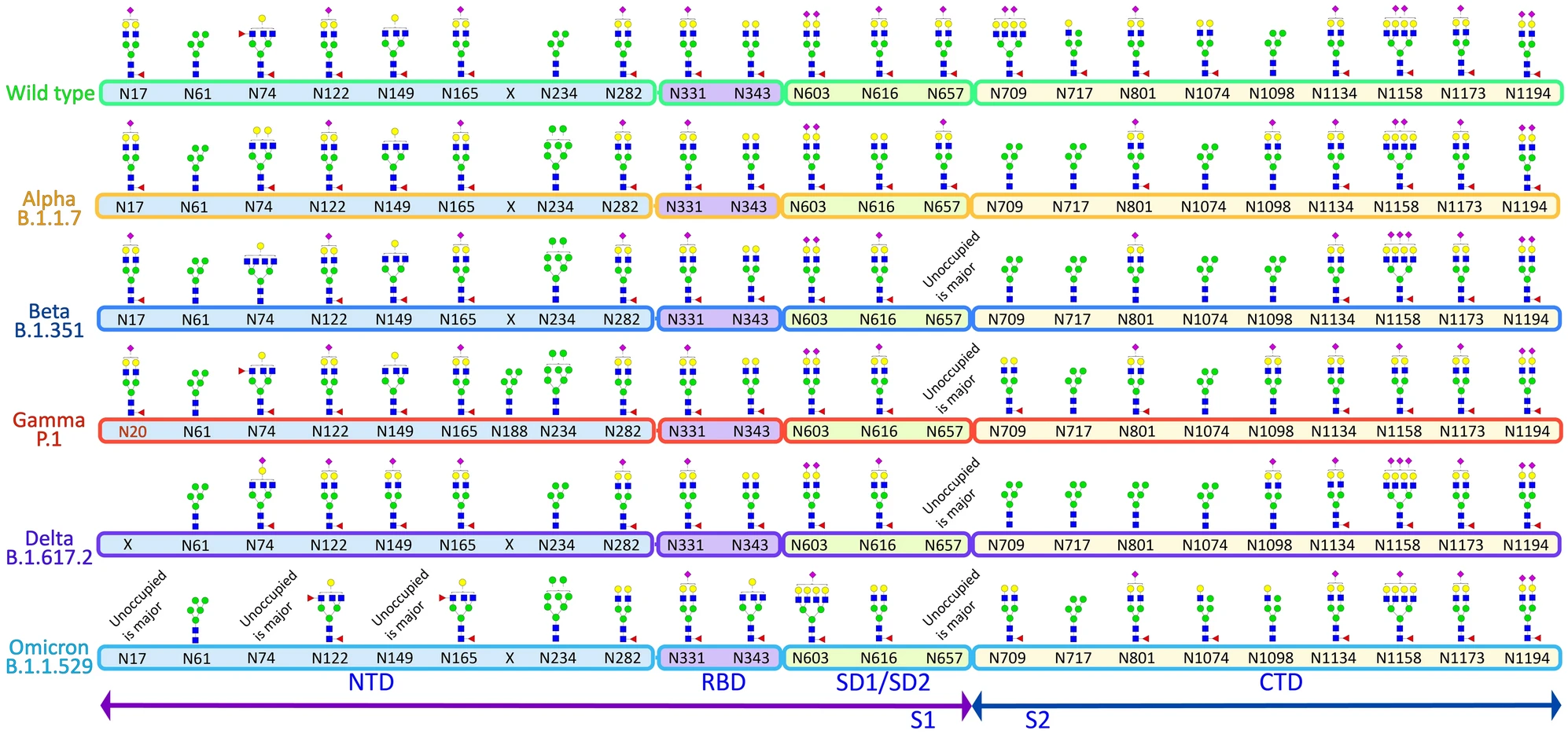PTM Sites Identification Service
PTM Sites Identification Service not only identifies modified proteins but also precisely determines the exact locations of PTMs within the amino acid sequence, unveiling their functional impact on biological processes. Post-translational modification (PTM) sites refer to specific amino acid residues where chemical modifications occur after protein translation. Different types of PTMs act on specific amino acids, for example, acetylation generally occurs on lysine (Lys, K), methylation generally occurs on lysine (Lys, K) and arginine (Arg, R).Changes in PTM sites can significantly impact protein activity, interactions, and subcellular localization, ultimately influencing biological functions. PTM Sites Identification plays a crucial role in understanding protein function regulation, signal transduction pathways, and disease mechanisms. Leveraging advanced chromatography and mass spectrometry platforms, MtoZ Biolabs offers PTM Sites Identification Service for the precise detection and localization of phosphorylation, acetylation, methylation, glycosylation, ubiquitination, and other PTM sites, revealing dynamic protein modification patterns and their biological significance, providing powerful data support for life science research and drug development.

Forrest S. Welch M. Science Progress. 2020.
Figure 1. An overview of the most common PTM and PTM sites in bacteria.
Analysis Workflow
1. Sample Preparation:
Extract the target protein and digest it using proteases.
2. Peptide Enrichment:
Enrich modified peptides using specific enrichment techniques. Common enrichment methods include antibody capture and metal affinity chromatography (IMAC).
3. Mass Spectrometry Analysis:
Analyze the peptides using liquid chromatography-mass spectrometry (LC-MS/MS).
4. Data Analysis:
Compare the mass spectrometry data with protein database information to determine the exact location of modification sites.
Services at MtoZ Biolabs
Leveraging advanced chromatography and mass spectrometry platforms, MtoZ Biolabs offers a range of post-translational modification (PTM) analysis services, including qualitative analysis of modified proteins, PTM sites identification, and quantitative analysis of modified proteins. MtoZ Biolabs, an integrated Chromatography and Mass Spectrometry (MS) Services Provider, provides advanced proteomics, metabolomics, and biopharmaceutical analysis services to researchers in biochemistry, biotechnology, and biopharmaceutical fields. Our ultimate aim is to provide more rapid, high-throughput, and cost-effective analysis, with exceptional data quality and minimal sample consumption.
FAQ
Q. How to improve the accuracy of PTM modification site identification and avoid false positives?
The methods to improve the accuracy of PTM site identification and reduce false positives mainly include the following strategies:
1. Optimize Database Search Strategy:
Set an appropriate FDR (False Discovery Rate) threshold (usually ≤1%) to control the false positive rate.
Use Delta Score (PTM credibility score) or Ascore to evaluate the credibility of the modification site. Usually, Ascore ≥13 represents a higher confidence.
Choose appropriate search parameters, such as allowing variable modifications but limiting the types of modifications, to avoid an overly broad search space that may lead to incorrect matches.
2. Multi-stage Mass Spectrometry (MS3) or Optimize Fragmentation Modes:
ETD (electron transfer dissociation) is more advantageous for charged modifications (such as phosphorylation and glycosylation), which can reduce the loss of secondary fragmentation information of modified peptides and improve positioning accuracy. Or use a combination of ETD and HCD to provide more comprehensive PTM site coverage.
3. Characteristic Fragment Ion Verification:
Use characteristic fragment ions, such as the phosphorylation ion (97.98 Da) or HexNAc ion (204 Da), to assist in confirming the PTM type and site.
4. Biological Verification:
Combine site-directed mutagenesis (S/T/Y→A) and Western blot using modification-specific antibodies to ensure the authenticity of modification sites and their functional relevance.
Service Advantages
1. Advanced Analysis Platform: MtoZ Biolabs established an advanced PTM Sites Identification Service platform, guaranteeing reliable, fast, and highly accurate analysis service.
2. One-Time-Charge: Our pricing is transparent, no hidden fees or additional costs.
3. High-Data-Quality: Deep data coverage with strict data quality control. AI-powered bioinformatics platform integrates all PTM Sites Identification Service data, providing clients with a comprehensive data report.
4. Customized Services: With years of experience in various post-translational modification (PTM) omics fields, MtoZ Biolabs offers tailored analysis services to meet your specific needs.
Deliverables
1. Comprehensive Experimental Details
2. Materials, Instruments, and Methods
3. Total Ion Chromatogram & Quality Control Assessment (project-dependent)
4. Data Analysis, Preprocessing, and Estimation (project-dependent)
5. Bioinformatics Analysis
6. Raw Data Files
Case Study
This study utilized LC-MS/MS combined with a selective glycopeptide enrichment strategy to precisely map O-glycosylation sites on the key spike protein (S protein) of SARS-CoV-2 and performed a comparative analysis across different variants (e.g., Alpha, Beta, Gamma, Delta, and Omicron). The results revealed significant differences in O-glycosylation sites and occupancy among variants, with certain O-glycosylation modifications potentially influencing the conformation of the receptor-binding domain (RBD) and virus-host cell interactions. This study provides key structural biology information for understanding viral adaptive changes, immune escape mechanisms, and the optimization of vaccine and antibody therapies, which will help further improve SARS-CoV-2 prevention and control strategies.

Shajahan A. et al. Sci Rep. 2023.
Figure 2. Most abundant glycan structure on each site of the WT and VOCs.
How to order?







